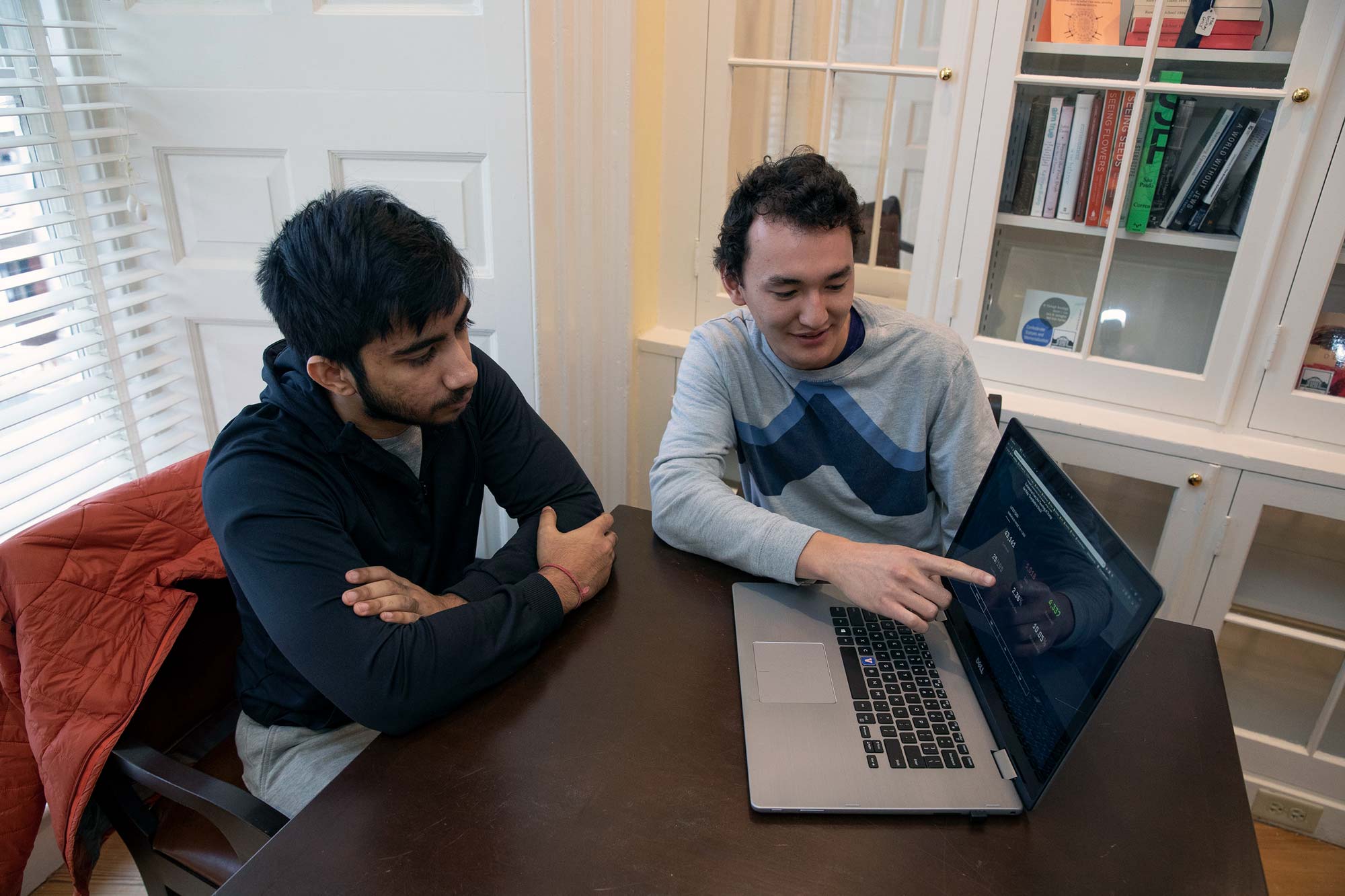Four technologically and societally minded friends who graduated from Yorktown High School in Arlington a couple of years ago have maintained a friendship that is carrying through their college years at the University of Virginia, Virginia Tech and Stanford University – and are using their relationship to keep the public informed about a major health threat.
Recently they teamed to build a public website that tracks the coronavirus epidemic, recently declared by the World Health Organization to be a “public health emergency of international concern.”
The site provides near-real-time information about the spread of the virus, including infection and mortality rates, recovery rates and locations by country, with links to the latest news and additional information.

Computer science students Soukarya Ghosh, left, and James Yun developed a coronavirus tracking website with old high school friends who are now at Stanford and Virginia Tech. (Photo by Dan Addison, University Communications)
The UVA team members are Soukarya Ghosh, a third-year computer science and mathematics major, and James Yun, a fourth-year computer science major. Their collaborators are Bilguunzaya Battogtokh, a junior computer science major at Stanford, and Austin Stout, a junior computer science major at Virginia Tech.
Ghosh discusses the project for readers of UVA Today.
Q. What is your purpose for the website?
A. My partner, James Yun, and I were first alerted to the presence of the novel coronavirus around Jan. 28, when UVA began sending out cautionary emails to the University community. It was on the 30th that James came to me with the idea of building a web application that could help people stay up-to-date with the latest state of the virus. We realized that this idea could potentially save lives by acting as a forewarning to those in dangerous regions, as the number of regions began growing at an exponential rate.
So we prioritized being informative over everything else, laying out the website in a fashion that allows visitors to get real-time data without having to jump through hoops. We began development immediately, finding the little time we had in between classes and homework and putting it toward getting a first version of our vision out to the public.
Q. How did you build this site, and where did you get the data?
A. Both of us being upperclassmen in the computer science major, we were well-equipped to take on the task of building a full-stack web application that could handle all the different features we intended to include. We started off by gathering various data sources, such as DXY, an online community of Chinese health care professionals; the World Health Organization; and the U.S. Centers for Disease Control, and compiling it into a real-time map that reveals the ever-increasing presence of the virus.
Q. Are you also attempting to use data science to predict the spread of the virus?
A. We had the idea of using this data to create a machine-learning model that could predict where the disease would be headed next and how fast it would get there. However, due to a lack of access to appropriate data of past diseases, this is still a task that is unfinished on our end. We are continuously developing the website, adding in suggested features, as well as optimizing the current ones.
We do plan on tackling prediction once our current implementation tasks are completed.
Q. Why did you include colleagues at Stanford and Virginia Tech?
A. In building the application, we quickly realized two hands were not enough to make desired progress. So, James and I invited our friends from high school, Bilguunzaya Battogtokh, who is a junior computer science major at Stanford University, and Austin Stout, a junior computer science major at Virginia Tech. They were quickly onboarded to the primary goal and helped build out our vision.
Q. How do you expect to use your training and education at UVA in your career, and for society generally?
A. The training and education we have received in our past three years at UVA have prepared us to take on this ambitious project. As a first-year, debating whether to declare computer science as my major, I would have never dreamed that I would learn so much so quickly, and for this, I have the amazing computer science faculty and staff to thank. I believe the skills we develop here set us up to impact the world in tangible ways, like creating this web application that is meant to educate people about the dangers of a life-threatening virus.
I am grateful for all the opportunities UVA has provided me and I hope to represent my school well as I go out into my career, aiding humanity on a large scale.
Media Contact
Article Information
February 12, 2020
/content/computer-science-students-build-coronavirus-tracking-website
